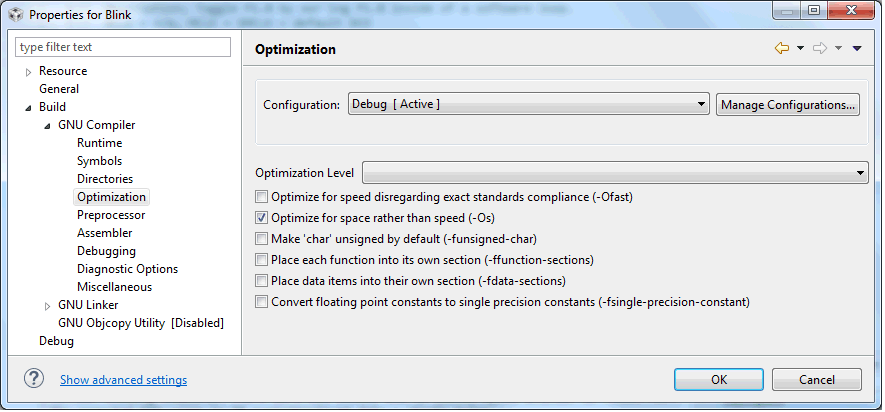SLAU646F September 2015 – June 2020
- Read This First
- 1Introduction
- 2Installing MSP430 GCC Toolchain
-
3Using MSP430 GCC Within CCS
- 3.1 Create New Project
- 3.2 Debug Using MSP-FET, MSPFET430UIF, eZ-FET, eZ430
- 3.3
Build Options for MSP430 GCC
- 3.3.1 GNU Compiler
- 3.3.2 GNU Compiler: Runtime
- 3.3.3 GNU Compiler: Symbols
- 3.3.4 GNU Compiler: Directories
- 3.3.5 GNU Compiler: Optimization
- 3.3.6 GNU Compiler: Preprocessor
- 3.3.7 GNU Compiler: Assembler
- 3.3.8 GNU Compiler: Debugging
- 3.3.9 GNU Compiler: Diagnostic Options
- 3.3.10 GNU Compiler: Miscellaneous
- 3.3.11 GNU Linker
- 3.3.12 GNU Linker: Basic
- 3.3.13 GNU Linker: Libraries
- 3.3.14 GNU Linker: Symbols
- 3.3.15 GNU Linker: Miscellaneous
- 3.3.16 GNU Objcopy Utility
- 3.4 CCS Compared to MSP430 GCC
-
4MSP430 GCC Stand-Alone Package
- 4.1 MSP430 GCC Stand-Alone Package Folder Structure
- 4.2 Package Content
- 4.3 MSP430 GCC Options
- 4.4 MSP430 Built-in Functions
- 4.5 Using MSP430 GCC Support Files
- 4.6 Quick Start: Blink the LED
- 4.7 GDB Settings
- 5MSP430 GCC Features
- 6Building MSP430 GCC From Sources
- 7MSP430 GCC and MSPGCC
- 8Appendix
- 9References
- Revision History
3.3.5 GNU Compiler: Optimization
Figure 3-7 shows the MSP430 GCC Optimization settings window.
 Figure 3-7 MSP430 GCC Settings: Optimization
Figure 3-7 MSP430 GCC Settings: OptimizationTable 3-5 describes the options that are available for MSP430 GCC Optimization settings.
Table 3-5 MSP430 GCC Settings: Optimization
| Option | Description |
|---|---|
| Optimization Level | Specifies the
optimizations that the compiler applies to the generated object code. The options
available are:
|
| Make 'char'
unsigned by default (-funsigned-char) |
Enable this option to ensure that the char is signed. |
| Place each function into its own section (-ffunction-sections) | Enable this option to place each function in its own section in the output file. |
| Place data items into their own section (-fdata-sections) | Enable this option to place each data item in its own section in the output file. |
| Convert floating
point constants to single precision constants (-fsingle-precision-constant) |
Treat floating-point constants as single precision instead of implicitly converting them to double-precision constants. |
Note:
Use the -ffunction-sections and -fdata-sections options in conjunction with the --gc-sections linker option to reduce code size by allowing the linker to remove unused sections.